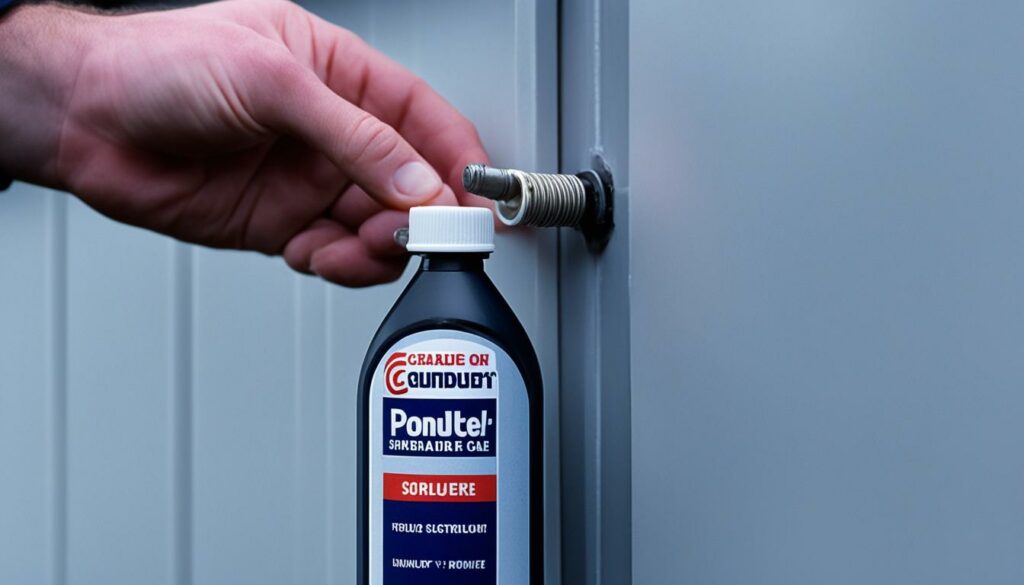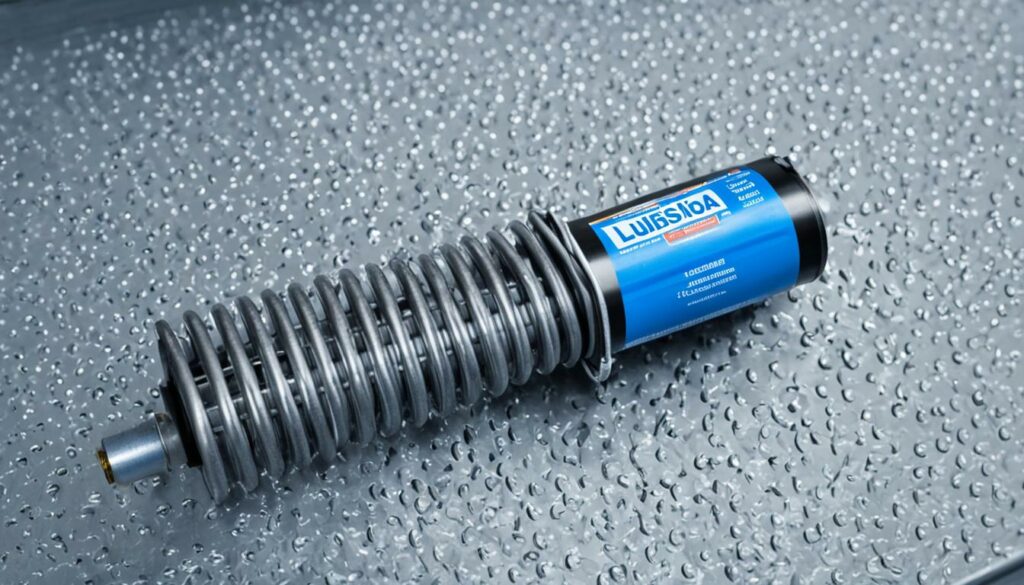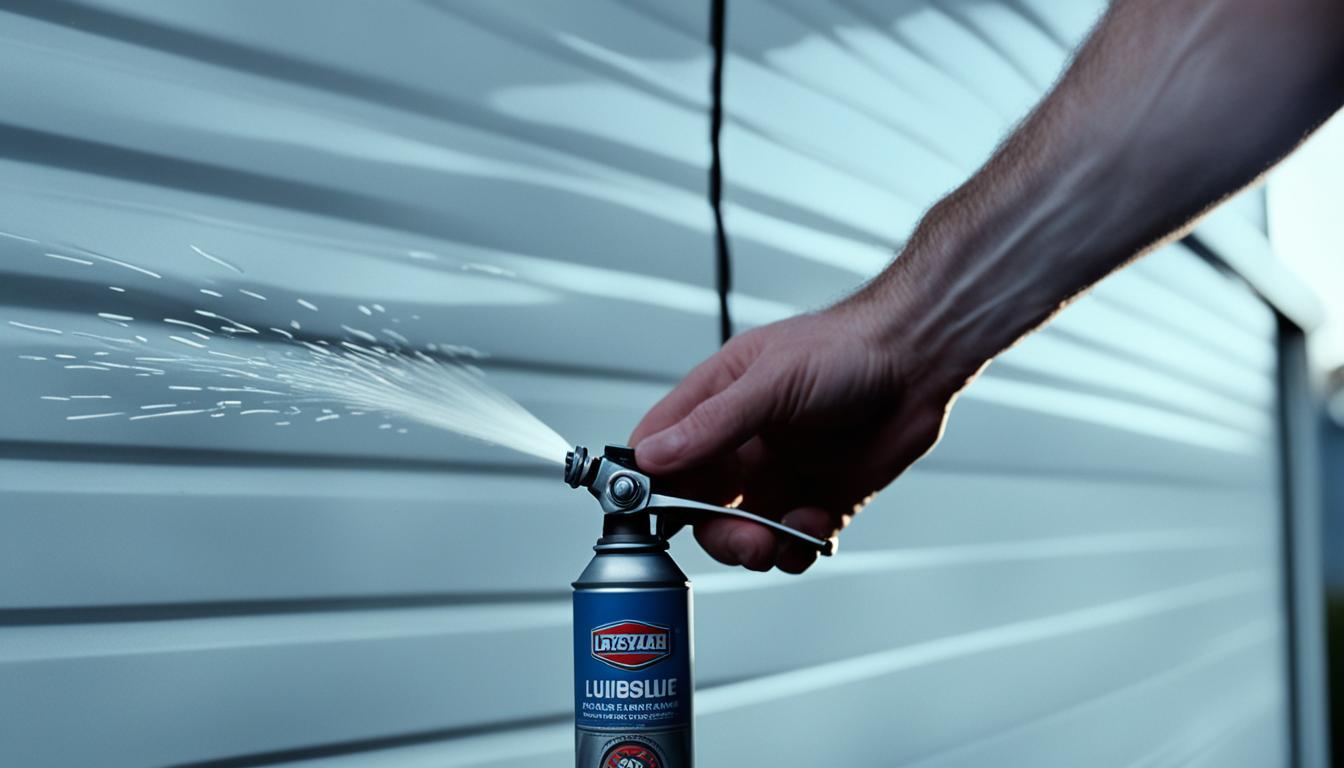Is your garage door making spooky sounds like a haunted house? No worries, mate! With some work and the right garage door spring lubrication tricks, you can fix that noise. But the big question is: do you really know how to lubricate garage door torsion springs the right way?
One top garage door maker, Clopay, says you should do spring care every year. They think using their Clopay Garage Door Pro Lube or a special lube is best. But how often should you do this maintenance?
The pros say doing proper garage door lubrication twice yearly is key for a smooth, quiet door. If you face tough weather, you might need to do it more. No one likes a loud, hard-to-open garage door!
So, get your hands on a can of WD-40 Specialist White Lithium Grease and a putty knife. Let’s get started with DIY garage door spring lubrication. This way, both your springs and your peace of mind will be better-off! Regular lubrication is one of the best ways to avoid the kind of sudden failure described in our guide on handling and repairing a snapped garage door spring, so make this a consistent part of your maintenance routine.
Key Takeaways
- Garage door spring care is crucial for maintaining a smooth-running door
- Lubricate your springs at least twice a year with a synthetic or silicone lubricant
- Use WD-40 Specialist White Lithium Grease and a putty knife for even application
- Regular maintenance can extend the life of your garage door components
- Proper lubrication is especially important in harsh environments
What is the best lubricant for garage door springs?
When you’re picking a lubricant for your garage door springs, many options are available. Look at your local hardware store for choices like mechanic’s grease. But, the best ones are lithium-based grease and silicone-based lubricants.
Top garage door makers say you should oil your doors twice a year. They recommend using synthetic or silicone lubes. For instance, Clopay suggests their Clopay Garage Door Pro Lube. WD-40 makes a White Lithium Grease just for garage doors. For best results, it’s important to follow proper techniques on how to lubricate garage door parts to ensure smooth operation and extend the life of your entire garage door system.
Silicone-based vs. Lithium-based Lubricants
Choosing between silicone sprays and white lithium grease means looking at a few things:
- Silicone sprays last long and work well in any weather.
- White lithium grease is safe from rust and sticks well to metal.
- Aerosol sprays are great for getting lube in small parts.
It’s vital to keep the door’s hinges, rollers, and springs oiled. It helps the door move easily and last longer. Failure to oil can lead to rust and breakage.
“Regular maintenance and lubrication of garage doors can extend the life of the door and reduce maintenance costs.” – Garage Door Expert
Recommended Garage Door Lubricants
| Brand | Product | Type |
|---|---|---|
| WD-40 | Specialist White Lithium Grease | Lithium-based |
| 3-In-One | Professional Garage Door Lubricant | Silicone-based |
| Blaster Chemical Company | Premium Silicone Garage Door Lubricant | Silicone-based |
| Liquid Wrench | Lubricating Oil | Petroleum-based |
Choose the right lube for your garage door springs. Use it often. This will keep your garage door working well and for a long time.
For more information on how do you lubricate a garage door spring?, visit our page on garage door repairs in Narangba.
Is WD-40 good for garage door springs?
Keeping your garage door well-lubricated is vital for it to run smoothly and last longer. WD-40 is a widely-used spray that’s good for many things. But is it the best for your garage door springs?
WD-40 is excellent for cleaning and removing grease. But it might not be your best bet for keeping your garage door torsion springs well-lubricated. The “WD” means it removes water and dirt. Though it’s great at cleaning, it’s not a top choice for making things run smoothly.
Experts advise against using WD-40 on garage door springs. Instead of helping, it could take away the needed lubrication. This might make your springs wear out quicker.
WD-40 White Lithium Grease for Garage Door Springs
Yet, you might like WD-40’s White Lithium Grease. It’s meant to keep garage doors moving well. And it’s a better choice than their regular spray for this job.
So, when you think about using WD-40 for your garage door springs, know about the lithium grease. While standard WD-40 isn’t ideal, their White Lithium Grease is made for this use.
| Lubricant | Recommended for Garage Door Springs | Benefits |
|---|---|---|
| WD-40 Standard Spray | No | Cleans and removes rust, but does not lubricate effectively |
| WD-40 Specialist White Lithium Grease | Yes | Provides long-lasting lubrication and protection against corrosion |
| Silicone-based Lubricants | Yes | Promotes smooth, friction-free operation and resists dirt and dust buildup |
In the end, regular WD-40 might not be great for garage door springs. But don’t forget about WD-40’s White Lithium Grease. Still, it’s best to go with what experts recommend. Try a silicone-based lubricant or a product made just for garage doors. This way, your garage door springs will work well for a long time.
Do springs need lubrication?
Garage door springs are crucial for a smooth garage door. They need maintenance like any moving part. Proper lubrication helps avoid rust and cuts down on repairs.
Yes, garage door springs must be oiled. Manufacturers suggest using a synthetic or silicone lubricant twice a year. Failing to oil your springs can cause them to wear early. It also makes them loud and can be unsafe.
Choosing the right lubricant is key. White lithium or silicone spray is best for garage doors. Never use WD-40; it’s not for springs.
| Garage Door Component | Lubrication Method | Recommended Frequency |
|---|---|---|
| Hinges | Spray grease on the edges of both sides of the bracket and each hinge | Twice per year |
| Rollers (nylon or plastic) | Spray grease on the bearing and ensure even distribution by manually operating the door | Twice per year |
| Tracks | Apply lithium-based grease or silicone-based lubricant sparingly to the inside of the track using a putty knife | Twice per year |
| Openers (chain or belt drives) | Spray WD-40 Specialist White Lithium Grease on the chain or belt and distribute evenly by running the opener | Twice per year |
| Springs | Spray WD-40 Specialist White Lithium Grease on the springs and spread evenly with a putty knife | 1-2 times per year |
Maintaining your garage door helps it last longer and operate quietly. Lubricating is critical in cold weather to avoid spring issues.
Make sure your garage door springs are the right size. Wrong sizes can cause early failure. A professional can check your door’s weight to find the best springs.
In summary, keeping your garage door springs lubricated is vital. With proper products and maintenance, your garage door will work safely for many years.
How often should I oil my garage door springs?

It’s key to keep your garage door well-maintained for smooth use and a long life. A major part of this is oiling the springs. But, how much should you do it?
Experts say to oil your springs two times a year, every six months. This keeps them working well and cuts down on problems. If you live by the sea or in tough weather, more oiling may be necessary.
Using the correct lubricant is just as important. Pick white lithium grease or silicone spray. They stick better to the springs. Avoid WD-40 because it can make the springs wear out quicker.
Below is a table showing how often you should oil your garage door springs. It’s based on how much you use your door and the kind of place you live in:
| Usage | Environment | Lubrication Frequency |
|---|---|---|
| Normal | Mild | Every 6 months |
| Heavy | Mild | Every 3-4 months |
| Normal | Harsh (coastal, extreme temperatures) | Every 3-4 months |
| Heavy | Harsh (coastal, extreme temperatures) | Every 2-3 months |
Your garage door springs’ life depends not only on regular care. It’s also about looking after other parts like rollers and hinges. Don’t forget to oil them too. It’s good for your whole garage door system.
Also, have a pro check your springs once a year. They look for wear and tear, make fixes, and change springs if they have to. This keeps your door going strong and can prevent it from breaking down.
How often should garage door springs be lubricated?
Garage door springs are key to your door working well. They need regular care to stay smooth and last long. Lubricating these springs helps to lower friction and stops them from wearing out too soon. But, how much should you do this?
Experts suggest, grease them up at least annually or twice. This keeps them working well and prolongs their life. But, check the springs more if you use the door a lot, or the weather is tough. The spray you use can also change how often you need to do it.
For the best slick, go for a white lithium or silicone spray, pros say. These are tough enough for garage doors and guard against rust. Don’t pick WD-40 or such. They may hurt more than help.
| Lubrication Frequency | Recommended Lubricant | Benefits |
|---|---|---|
| 1-2 times per year | White lithium or silicone-based spray | Extends spring lifespan, reduces friction, prevents rust and corrosion |
Don’t just oil the springs, though. The whole door needs care. Keep the rollers and door hinges clean, too. Good all-round care eases the door and opener, saving you from spending big on fixes.
Forget to oil your garage door springs? You’ll hear more noise, and they might break. Regulating this task in your car shed cleanup means your door will live longer and work better.
What is the best lubricant for springs?

Choosing the right lubricant for your garage door springs is key to keeping them working smoothly. There are many options to pick from. It’s vital to go for a top-notch product. This will help your springs work better for longer. Here are five top lubricants you might want to check out:
- WD-40 Specialist White Lithium Grease Spray
- DuPont Teflon Non-Stick Dry Film Lubricant
- 3-In-One Professional Garage Door Lubricant with Smart Straw
- Blaster Chemical Company Premium Silicone Garage Door Lubricant
- WD-40 Specialist Water-Resistant Silicone Lubricant
Consider a lubricant’s durability and how well it works in different temperatures. Silicone lubes last a long time and handle hot and cold conditions well. That’s why they are a great choice for garage door springs.
For a well-informed choice, here’s a look at the leading lubricants for garage door springs:
| Lubricant | Type | Key Features |
|---|---|---|
| WD-40 Specialist White Lithium Grease Spray | Lithium-based | Long-lasting, water-resistant, ideal for metal-to-metal applications |
| DuPont Teflon Non-Stick Dry Film Lubricant | Dry film | Reduces friction, prevents sticking, suitable for various materials |
| 3-In-One Professional Garage Door Lubricant with Smart Straw | Silicone-based | Precise application, prevents rust and corrosion, reduces wear |
| Blaster Chemical Company Premium Silicone Garage Door Lubricant | Silicone-based | Waterproof, withstands extreme temperatures, long-lasting lubrication |
| WD-40 Specialist Water-Resistant Silicone Lubricant | Silicone-based | Repels water, protects against rust, reduces friction and wear |
Don’t forget, keeping your garage door springs well-oiled is crucial. It helps them work at their best and live longer. Choose a top product and apply it two times a year. Your garage door will thank you. It will work quietly and smoothly for many years.
Is silicone or lithium grease better for garage doors?
When you want to keep your garage door working well, you might think about silicone or lithium grease. Both help make the door move smoothly. But they have some different benefits.
Many garage door makers say use silicone or synthetic lube for best results. Some don’t put silicone in their lube. So, you’ll see two main types: lithium-based and silicone-based.
White lithium grease is very common, especially for garage door springs. It mixes soap and oil, which is safe for metal. It sticks to metal and keeps out water and dust. It’s great for hinges, rollers, and springs.
| Lubricant Type | Characteristics | Suitable Components |
|---|---|---|
| White Lithium Grease | Thick, white, water and dust resistant, non-corrosive | Hinges, rollers, springs |
| Silicone Spray | Thin, clear, quick-drying, prevents rust and corrosion | Garage door parts |
On the flip side, silicone lubricants, like silicone spray, are clear and dry fast. They stop rust on garage door parts. They last long and work in many temperatures.
Think about this when picking silicone or lithium grease:
- White lithium grease has more oil than other petroleum lubes, which means better lubrication.
- A bit of white lithium grease keeps your garage door in great shape.
- Silicone lubricants can hurt car paint, so use them carefully.
Silicone and lithium grease both work well for your garage door. Your choice might come down to what you like and need. Whichever you pick, remember to lube your door every three to six months. This keeps your garage door working well for a long time.
Should you spray lubricant on garage door springs?
Lubricating your garage door springs is key to making sure your door works well and lasts longer. It is often missed by homeowners but doing it once or twice a year is good. This small step can stop rust, lower friction, and make your springs last longer.
For your garage door torsion springs, using the right lubricants is very important. Experts suggest white lithium grease or silicone spray are best. These are made to stick to the springs and protect them for a long time. First, you spray the lubricant on, then spread it with a putty knife to cover the springs well.
Avoiding common lubricant mistakes
Using WD-40 for garage door springs is not a good idea. It’s a cleaner, not a lube. It can remove existing grease, making things worse. Instead, choose a special garage door lubricant or WD-40 Specialist White Lithium Grease. These are made just for garage doors. The right products keep your door quiet and working for a long time.
Garage Door Spring Repair Near You
For any help with garage door spring repairs, don’t hesitate to contact Jarred at Impact Doors. Our expert team is ready to assist you with all your garage door needs. Give us a call at (07) 5451 4022 to schedule your repair and ensure your garage door operates smoothly and safely.

